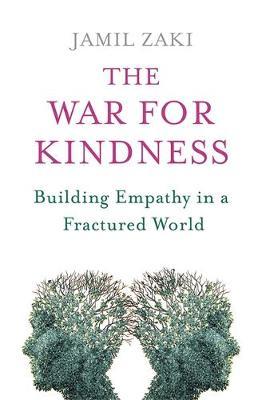War for Kindness

War for Kindness
'Scientific, gripping, groundbreaking and hopeful. The War for Kindness is the message for our times' - Carol Dweck, author of Mindset
Empathy has been on people's mind a lot lately. Philosophers, evolutionary scientists and indeed former President Obama agree that an increase in empathy could advance us beyond the hatred, violence and polarization in which the world seems caught. Others disagree, arguing it is easiest to empathize with people who look, talk or think like us. As a result, empathy can inspire nepotism, racism and worse.
Having studied the neuroscience and psychology of empathy for over a decade, Jamil Zaki thinks both sides of this debate have a point. Empathy is sometimes an engine for moral progress, and other times for moral failure. But Zaki also thinks that both sides are wrong about how empathy works.
Both scientists and non-scientists commonly argue that empathy is something that happens to you, sort of like an emotional knee-jerk reflex. Second, they believe it happens more to some people than others. This lines people up along a spectrum, with deep empaths on one end and psychopaths on the other. What's more, wherever we are on that spectrum, we're stuck there.
In The War for Kindness, Zaki lays out a very different view of how empathy works, one that breaks these two assumptions. Empathy is not a reflex; it's a choice. We choose empathy (or apathy) constantly: when we read a tragic novel, or cross the street to avoid a homeless person, or ask a distraught friend what's the matter. This view has crucial consequences: if empathy is less a trait (like height), and more a skill (like being good at word games), then we can improve at it. By choosing it more often, we can flex our capabilities and grow more empathic over time. We can also "tune" empathy, ramping it up in situations where it will help and turning it down when it might backfire.
Zaki takes us from the world of doctors who train medical students to empathise better to
PRP: 118.84 Lei
Acesta este Pretul Recomandat de Producator. Pretul de vanzare al produsului este afisat mai jos.
106.96Lei
106.96Lei
118.84 LeiIndisponibil
Descrierea produsului
'Scientific, gripping, groundbreaking and hopeful. The War for Kindness is the message for our times' - Carol Dweck, author of Mindset
Empathy has been on people's mind a lot lately. Philosophers, evolutionary scientists and indeed former President Obama agree that an increase in empathy could advance us beyond the hatred, violence and polarization in which the world seems caught. Others disagree, arguing it is easiest to empathize with people who look, talk or think like us. As a result, empathy can inspire nepotism, racism and worse.
Having studied the neuroscience and psychology of empathy for over a decade, Jamil Zaki thinks both sides of this debate have a point. Empathy is sometimes an engine for moral progress, and other times for moral failure. But Zaki also thinks that both sides are wrong about how empathy works.
Both scientists and non-scientists commonly argue that empathy is something that happens to you, sort of like an emotional knee-jerk reflex. Second, they believe it happens more to some people than others. This lines people up along a spectrum, with deep empaths on one end and psychopaths on the other. What's more, wherever we are on that spectrum, we're stuck there.
In The War for Kindness, Zaki lays out a very different view of how empathy works, one that breaks these two assumptions. Empathy is not a reflex; it's a choice. We choose empathy (or apathy) constantly: when we read a tragic novel, or cross the street to avoid a homeless person, or ask a distraught friend what's the matter. This view has crucial consequences: if empathy is less a trait (like height), and more a skill (like being good at word games), then we can improve at it. By choosing it more often, we can flex our capabilities and grow more empathic over time. We can also "tune" empathy, ramping it up in situations where it will help and turning it down when it might backfire.
Zaki takes us from the world of doctors who train medical students to empathise better to
Detaliile produsului








